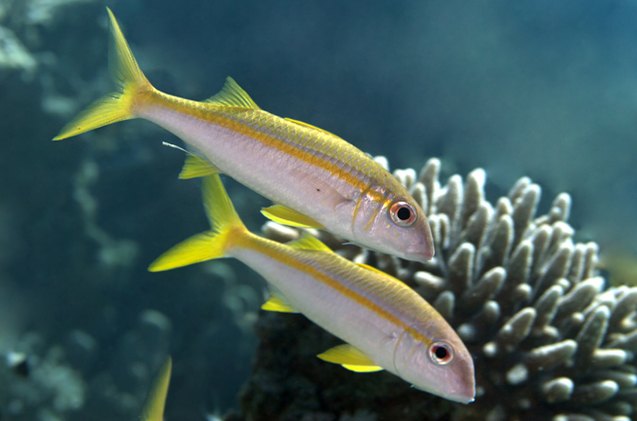Goatfish


About Goatfish
The species known as goatfish are members of the family Mullidae and they are saltwater fish that can be found throughout the world in temperate, subtropical, and tropical waters. Most species inhabit the lower regions of the water column, though some of the more tropical species can be found in coral reefs. For the most part, goatfish are schooling fish and they are generally not aggressive by nature.
Goatfish are members of the family Mullidae, and they are saltwater fish that can be found throughout the world.
Various species of goatfish can be found all over the world in temperate to tropical waters.
Different species of goatfish exhibit different colorations, some more bland than others. There are several species of goatfish that are vibrantly colored in hues of bright yellow, red, or blue and some species exhibit horizontal stripes or bars. An interesting fact about goatfish is that they have the ability to change color quickly to blend in with their surroundings.
While some goatfishes remain small, some species can grow as large as 24 inches in length. For the most part, however, goatfish only grow to a maximum around 12 inches but they should still be kept in very large tanks to accommodate for their schooling needs. These fish can tolerate a variety of conditions but they generally prefer warm water with moderate hardness between 8 and 12 dKH and a slightly alkaline pH between 8.1 and 8.4. Goatfishes are bottom-feeders so they need plenty of space along the bottom of the tank, though they do appreciate live rock with options for hiding places.
An interesting fact about goatfish is that they have the ability to change color quickly to blend in with their surroundings.
Goatfishes are benthic feeders which means that they often sift through the sandy substrate to find food. These fish will feed on a variety of meaty foods such as small crustaceans, worms, other insects, and sometimes small fish. In the home aquarium, goatfishes should be offered a variety of fresh and frozen meaty foods as well as sinking carnivore pellets and granules.
Also read: Tips and Tricks for Stocking a Community Tank
Most goatfishes are pelagic spawners which means that they release large numbers of buoyant eggs into the water where they float freely with the current until they hatch. The newly hatched larvae develop over a period of 4 to 8 weeks after which they metamorphose and develop barbels for bottom feeding.
There are approximately 86 species of goatfish belonging to the Mullidae family and they are distributed throughout six different genera. Some of the most popular species for the aquarium trade include the following:
- Whitesaddle Goatfishes (Parupeneus ciliatus)
- Yellow-Striped Goatfishes (Parupeneus chrysopleuron)
- Bicolor Goatfishes (Parupeneus barberinoides)
- Yellow Goatfishes (Parupeneus cyclostoma)
- Double Bar Goatfishes (Parupeneus bifasciatus)
- Yellow Black Goatfishes (Parupeneus barberinus)
Photo credit: orlandin/Bigstock; LDinraths/Bigstock

Kate Barrington is the loving owner of two cats (Bagel and Munchkin) and a noisy herd of guinea pigs. Having grown up with golden retrievers, Kate has a great deal of experience with dogs but labels herself a lover of all pets. Having received a Bachelor's degree in English, Kate has combined her love for pets and her passion for writing to create her own freelance writing business, specializing in the pet niche.
More by Kate Barrington
























